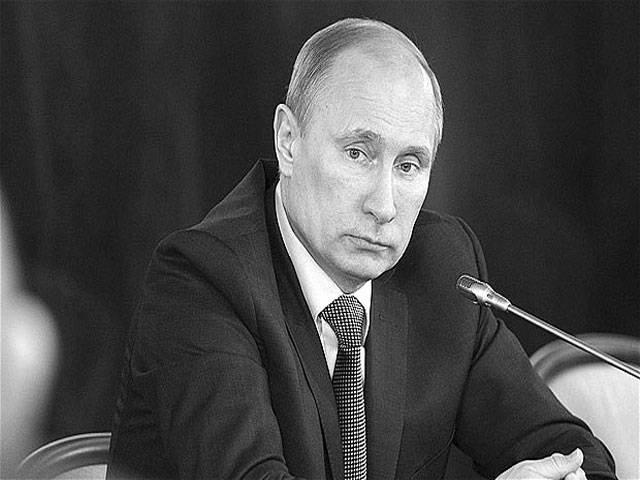MOSCOW - Prime Minister Vladimir Putin vowed on Thursday to end police repression in Russia and make government more accountable, as he kicked off his campaign for the presidential election after mass protests. In his manifesto for the March 4 election where he plans to take an unprecedented third Kremlin term, Putin also promised to build a strong Russia and retaliate against Western states that failed to listen to Moscow. The manifesto, posted on his new campaign site putin2012.ru, has been published one month after the start of anti-Putin protests which rallied tens of thousands and posed the biggest challenge to his 12-year rule of Russia. “We need to re-think the whole system of public security,” Putin wrote in the election programme.
The behaviour of the security forces is seen as one of Russia’s biggest scourges due to widespread corruption and iron-fisted tactics. The promise by Putin may be seen as a concession to the protest movement.
“This situation is deforming our society and is making it morally unhealthy. The actions of the security forces should be aimed at protecting and supporting legal business — not fighting it,” he added.
Putin has been repeatedly lambasted by critics during his two terms in the Kremlin to 2008 and his current stint as prime minister for allowing the security forces Soviet-style powers to control society.
But Putin promised: “We will ensure the accountability of the authorities towards the society that they are working for.” He proposed “effective government under the control of the people.”
The liberal Yabloko party leader Sergei Mitrokhin expressed suspicion about the pledges. “I do not think they will be implemented given he has got used to ruling through the security forces,” he told the Interfax news agency.
Despite the pledge for more accountability, Putin’s spokesman rejected calls for him to take part for the first time in televised campaign debates with his main rivals like Communist leader Gennady Zyuganov.
Putin’s participation would require a “formal vacation” which would “interfere with his duties” as premier, Dmitry Peskov told Russian news agencies. He did not rule out Putin sending representatives to take part in debates.
In a stern warning to the West, Putin also vowed that world powers would not be able to make decisions “behind the back of Russia or avoiding Russia and her interests.”
“Unilateral actions by our partners that fail to take into account Russia’s opinion and her interests will receive a corresponding response,” Putin wrote.
He promised to create “strong Russia in a complex world” and said that under his rule Moscow had “restored its position as one of the leading world powers”.
On the economy, Putin promoted a programme of urgent modernisation identical to the drive championed by current President Dmitry Medvedev who is stepping aside to allow his mentor back into the Kremlin.
“The model of economic growth for the last decade — based on high oil prices and wasted capacities that was built back in the USSR — has exhausted itself,” said Putin.
The presidential election is now seen by analysts as a far tougher challenge for Putin after the rallies that brought together tens of thousands of people in Moscow and broke the taboo against mass protest in Russia.
His snazzy campaign website is adorned with pictures of a gritty-looking Putin and appears to show a new interest from the premier in the Internet, a medium he once famously dismissed as consisting of “half porn”.
In apparent response to the growing enthusiasm for blogging in Russia, there is a section called “suggestions of the voters” where people can post entries which are then rated for popularity.
Unfortunately for Putin, just hours after the site’s launch the most popular suggestions were from critics calling on him to quit: “Leave politics, please. We understand that power is a drug but that would be a dignified act,” said one named as Andrei Antonenko.
Friday, April 19, 2024
Putin vows to end repression

9:58 PM | April 18, 2024
King Charles's cancer ‘eating him alive,' monarch unable to perform duties: Insider
1:02 AM | April 19, 2024
Mehwish Hayat says she would like to work with Aamir Khan
9:59 PM | April 18, 2024
What caused record-breaking rainfall in UAE?
9:58 PM | April 18, 2024
Donald Trump discusses Ukraine, Middle East, NATO with Polish President Duda
9:57 PM | April 18, 2024
'That'll be awesome,' Rohit Sharma on idea of Pakistan vs India Test series
9:17 PM | April 18, 2024
Hepatitis Challenge
April 18, 2024
IMF Predictions
April 18, 2024
Wheat War
April 18, 2024
Rail Revival
April 17, 2024
Addressing Climate Change
April 17, 2024
Justice denied
April 18, 2024
AI dilemmas unveiled
April 18, 2024
Tax tangle
April 18, 2024
Workforce inequality
April 17, 2024
New partnerships
April 17, 2024
ePaper - Nawaiwaqt
Advertisement
Nawaiwaqt Group | Copyright © 2024





